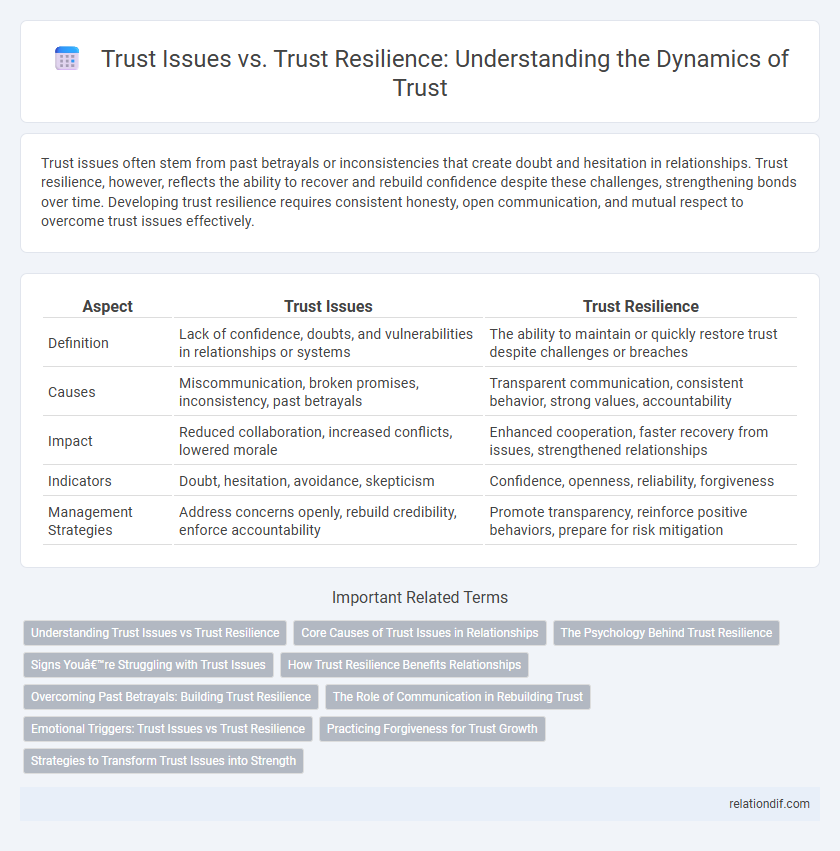Trust issues often stem from past betrayals or inconsistencies that create doubt and hesitation in relationships. Trust resilience, however, reflects the ability to recover and rebuild confidence despite these challenges, strengthening bonds over time. Developing trust resilience requires consistent honesty, open communication, and mutual respect to overcome trust issues effectively.
Table of Comparison
| Aspect | Trust Issues | Trust Resilience |
|---|---|---|
| Definition | Lack of confidence, doubts, and vulnerabilities in relationships or systems | The ability to maintain or quickly restore trust despite challenges or breaches |
| Causes | Miscommunication, broken promises, inconsistency, past betrayals | Transparent communication, consistent behavior, strong values, accountability |
| Impact | Reduced collaboration, increased conflicts, lowered morale | Enhanced cooperation, faster recovery from issues, strengthened relationships |
| Indicators | Doubt, hesitation, avoidance, skepticism | Confidence, openness, reliability, forgiveness |
| Management Strategies | Address concerns openly, rebuild credibility, enforce accountability | Promote transparency, reinforce positive behaviors, prepare for risk mitigation |
Understanding Trust Issues vs Trust Resilience
Trust issues often stem from past betrayals, inconsistent behavior, or lack of transparency, leading to skepticism and emotional barriers. Trust resilience refers to the ability to rebuild and maintain trust despite setbacks, emphasizing consistent communication, empathy, and accountability. Understanding the dynamics between trust issues and trust resilience is crucial for fostering healthy relationships and organizational stability.
Core Causes of Trust Issues in Relationships
Trust issues in relationships often stem from core causes such as past betrayals, inconsistent communication, and unmet expectations. Emotional wounds from previous experiences can create insecurity and fear, undermining trust resilience. Building trust resilience requires acknowledging these root causes and fostering transparency, empathy, and reliability.
The Psychology Behind Trust Resilience
Trust resilience stems from cognitive flexibility and emotional regulation, enabling individuals to recover from breaches of trust without long-term damage to relationships. Psychological studies highlight the role of secure attachment styles and positive past experiences in fostering resilience, allowing people to rebuild confidence after trust violations. Neural mechanisms involving the prefrontal cortex support adaptive responses by regulating fear and promoting social learning, which are essential for maintaining trust in dynamic social environments.
Signs You’re Struggling with Trust Issues
Difficulty in believing others' intentions, frequent suspicion without evidence, and reluctance to share personal information are clear signs you're struggling with trust issues. Experiencing emotional distance in relationships and expecting betrayal even in supportive environments reflect low trust resilience. Recognizing these symptoms early can help in developing strategies to rebuild trust and foster healthier connections.
How Trust Resilience Benefits Relationships
Trust resilience strengthens relationships by enabling individuals to recover quickly from breaches, fostering long-term stability and deeper emotional bonds. It promotes open communication and mutual understanding, reducing the impact of misunderstandings and conflicts. Enhanced trust resilience supports collaboration, increases loyalty, and builds a foundation for persistent psychological safety.
Overcoming Past Betrayals: Building Trust Resilience
Overcoming past betrayals requires developing trust resilience by recognizing patterns of broken trust and actively working to rebuild confidence through consistent, transparent actions. Emphasizing open communication and emotional accountability helps repair fractured relationships and fosters a foundation for renewed trust. Building trust resilience strengthens emotional well-being and promotes long-term relational stability despite previous trust issues.
The Role of Communication in Rebuilding Trust
Effective communication plays a pivotal role in rebuilding trust by fostering transparency and accountability between parties. Open dialogue helps address misunderstandings and clarifies intentions, which is essential for overcoming trust issues. Consistent and empathetic communication reinforces trust resilience, enabling relationships to recover and strengthen over time.
Emotional Triggers: Trust Issues vs Trust Resilience
Emotional triggers often exacerbate trust issues by activating fears of betrayal and vulnerability, leading to defensive behaviors and relationship strain. In contrast, trust resilience is strengthened through emotional awareness and regulation, allowing individuals to process past wounds without reactive distrust. Building trust resilience involves recognizing these triggers and choosing responses that promote healing and secure connections.
Practicing Forgiveness for Trust Growth
Trust issues often stem from past betrayals or unmet expectations, creating barriers to relationship growth. Practicing forgiveness enables emotional healing and fosters trust resilience by allowing individuals to move beyond grievances and rebuild confidence. Consistent forgiveness strengthens relational bonds and promotes long-term trust development.
Strategies to Transform Trust Issues into Strength
Addressing trust issues requires consistent transparency, active listening, and accountability to rebuild confidence and foster trust resilience. Implementing regular feedback loops and demonstrating reliability through consistent actions strengthens relationships and mitigates the impact of past breaches. Cultivating empathy and open communication channels transforms trust deficits into opportunities for deeper connection and collaborative growth.
Trust issues vs trust resilience Infographic

 relationdif.com
relationdif.com